|
|
|
Sort Order |
|
|
|
Items / Page
|
|
|
|
|
|
|
| Srl | Item |
| 1 |
ID:
143677
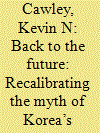

|
|
|
|
|
| Summary/Abstract |
This article reviews Korea’s multicultural past, while also tracing the evolution of the myth of ethnic Korean homogeneity via the Tan’gun myth, whose earliest extant record dates from the thirteenth century. It highlights how the myth was recalibrated in the twentieth century in the face of Japanese cultural imperialism, and used to promote a nationalist, homogenous Korean identity. By exploring past intercultural exchanges and developments, this article also illustrates how this modern ‘homogenous’ identity has been misconstructed by both North and South Korea. This is now especially anachronistic for contemporary South Korea, which is fast becoming multiracial and multicultural, but where biracial people are often discriminated against. Finally, I argue that by deconstructing the Tan’gun myth, one discovers that it already inherently possesses the potential to resolve the problematic nationalistic myth of ethnic homogeneity in a growing multiracial society, which still, in the twenty-first century, emphasises racial ‘purity’.
|
|
|
|
|
|
|
|
|
|
|
|
|
|
|
|
| 2 |
ID:
179015
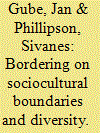

|
|
|
|
|
| Summary/Abstract |
This article illustrates the interface of ethnic identities and a multi-ethnic learning environment in a predominantly Chinese society. Hong Kong – whilst reputed as an Asian international city – has displayed reticence in promoting multicultural initiatives and inclusiveness at a policy level. In this context, this study draws on a sociocultural perspective and interviews with a group of ethnic minority Filipino secondary school students. The interview data point to juxtapositions of ethnic identities with reference to students’ interactions with peers from same and different ethnic groups, ethnic in-group practices, and a schooling discourse that reflects Chinese language expectations and recognition of cultural diversity. The analysis, as a result, specifies how schooling experiences in this case become grounds for identity tensions in being a Filipino and a Hong Kong person. These tensions caution against tacit sociocultural relations in learning environments resulting from school-initiated multicultural practices without broader and explicit policy support for culturally diverse student population.
|
|
|
|
|
|
|
|
|
|
|
|
|
|
|
|
| 3 |
ID:
147858
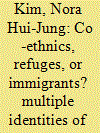

|
|
|
|
|
| Summary/Abstract |
The articles in this Special Issue critically examine a number of key aspects of North Koreans who have fled their home state and sought a new life in the ‘other’ Korea. The articles examine the landscape of government policy for North Koreans, the role of civil society and the media, and the lived experiences of North Koreans in South Korean society. The central theme of the Special Issue is the contentious politics of choosing and articulating identity categories; what kinds and by whom identity categories are imposed upon North Koreans and how North Koreans interpret these identity categories and strategically employ them. The Special Issue makes significant empirical and theoretical contributions to our understanding of North Koreans in South Korea and on the complex issue of ethnic boundary drawing.
|
|
|
|
|
|
|
|
|
|
|
|
|
|
|
|
| 4 |
ID:
137567
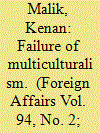

|
|
|
|
|
| Summary/Abstract |
Thirty years ago, many Europeans saw multiculturalism—the embrace of an inclusive, diverse society—as an answer to Europe’s social problems. Today, a growing number consider it to be a cause of them. That perception has led some mainstream politicians, including British Prime Minister David Cameron and German Chancellor Angela Merkel, to publicly denounce multiculturalism and speak out against its dangers. It has fueled the success of far-right parties and populist politicians across Europe, from the Party for Freedom in the Netherlands to the National Front in France. And in the most extreme cases, it has inspired obscene acts of violence, such as Anders Behring Breivik’s homicidal rampage on the Norwegian island of Utoya in July 2011.
|
|
|
|
|
|
|
|
|
|
|
|
|
|
|
|
| 5 |
ID:
152488
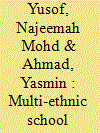

|
|
|
|
|
| Summary/Abstract |
This study aims to identify the challenges and approaches to improve a multicultural competency among teachers in multi-ethnic schools environment based on school leaders’ perspective. Data collection method used in this study is qualitative method. A total of nine school leaders from the states of Kedah, Penang, and Perak were included in the interview session. The results of this study show that the challenges faced by teachers in practicing the multicultural competency are lack of experience toward cultural diversity. A late exposure to cultural diversity makes it difficult for teachers to accept and adapt in a multi-ethnic school environment. The approaches suggested by school leaders to improve the multicultural competency are as follows: (1) Courses on cultural diversity should be organized to enhance the knowledge about cultural diversity; (2) the development of more open and better policy for education system in Malaysia in order to prepare teachers with a higher multicultural competency for teaching students from diverse ethnic and cultural groups; (3) an early exposure to cultural diversity in order to increase the multicultural competency, especially during teaching practicum.
|
|
|
|
|
|
|
|
|
|
|
|
|
|
|
|
| 6 |
ID:
133832
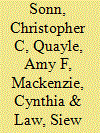

|
|
|
|
|
| Publication |
2014.
|
| Summary/Abstract |
From 2010 to 2012 a diverse group of young people participated in an oral history theatre project, Chronicles, which aimed to support them to claim a personally meaningful Australian identity. Oral history theatre was used to facilitate a process whereby the young people were able to reconnect with their personal family histories, encounter Aboriginal young people and stories, and together interview Aboriginal Elders. Through this process, they could develop new understandings of their own social identities, and meanings of and possibilities for belonging. 'Centring diverse lives, decentring whiteness' and 'a different starting point: Aboriginal ways of knowing', were the two key outcomes that we report on. Bringing people from diverse cultural and social backgrounds together to share stories of history, culture and identity, offers a unique vantage point from which to rupture dominant narratives about belonging/non-belonging and show up whiteness, and together forge a new Australian identity reflective of everyday multiculturalism.
|
|
|
|
|
|
|
|
|
|
|
|
|
|
|
|
| 7 |
ID:
152446
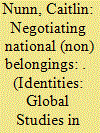

|
|
|
|
|
| Summary/Abstract |
Many immigrant-receiving countries are characterised by increasing multigenerational ethnocultural diversity, with associated policies and discourses of inclusion. Yet they often simultaneously resist relinquishing narratives and practices grounded in idealised notions of ethnocultural homogeneity. This results in the circulation of multiple, often competing, ideas of the nation, with significant implications for national (non)belonging among migrants and their descendants. Based on interviews with members of seven Vietnamese Australian families, this article explores their discursive navigation of two competing ideas of Australia: as ethnocultural and multicultural. Applying a conceptual framework of belonging that attends to the relation between the personal and the political, this article demonstrates that, for migrants and their descendants, national (non)belonging is a dynamic and dialogic process of negotiating multiple national spheres, each governed by different politics and offering different possibilities for belonging. The multigenerational interview cohort additionally provides insights into the role of migration generation in mediating this process.
|
|
|
|
|
|
|
|
|
|
|
|
|
|
|
|
| 8 |
ID:
191070
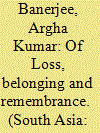

|
|
|
|
|
| Summary/Abstract |
This article undertakes a critical exploration of the Indian poetic responses to World War I. The most striking feature of this poetry was its uniquely diverse nature, which reflected in full the multicultural character of the Indian army at the Western Front and elsewhere in the world. The immense diversity of Indian soldiers triggered a wide range of emotions and ideas from combatants and civilians alike. While we have established writers like Rabindranath Tagore and Sarojini Naidu on the one hand, we have a poetic miscellany of lesser known creative voices on the other, some even documenting their first-hand experiences of the War. Poems, lyrical propaganda, folk-songs, epistolary verse, elegies and even verses accompanying posters make up the various modes of literary circulation during this time of unprecedented global turmoil. Making use of both original compositions and various other works in translation, this article argues that most of this poetic evidence often serves as crucial testimonies, chronicling not only the major historical events of the War years, but also assiduously recording the wide gamut of feelings and emotions associated with the conflict.
|
|
|
|
|
|
|
|
|
|
|
|
|
|
|
|
| 9 |
ID:
146829
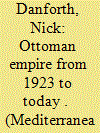

|
|
|
|
|
| Summary/Abstract |
Since its demise, the Ottoman Empire has been repeatedly reinvented. This essay traces the diverse and often unexpected ways that Ottoman history has served divergent political agendas over the past century, exploring the empire’s progression from religious to secular to pious and from multicultural to Turkish to tolerant.
|
|
|
|
|
|
|
|
|
|
|
|
|
|
|
|
| 10 |
ID:
125063
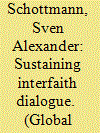

|
|
|
|
|
| Publication |
2013.
|
| Summary/Abstract |
Present-day Australia is often described as a successful example of a modern multicultural state. A growing number of non-British and non-European migrants have helped transform the country into an increasingly plural society. Intolerance and even outright racism persist in a few sectors, but on the whole, Australia's political, cultural and intellectual elites have accepted the need for migration, even if they have not always rushed to embrace the concept of multiculturalism. The most cursory of surveys of Australian cities, suburbs and even rural areas would readily reveal the extent to which the country has changed from the days of the 'white Australia' policy. Ethnic and cultural pluralism are just two measures of this new social pluralism; the growing diversity of religious expression is another very important dimension of Australia's multicultural reality. As Michális S. Michael points out, a key 'antidote to the politics of fear' has been the range of interfaith and multi-faith councils and networks that were set up in the course of the last 10 years. Some of these efforts were, in part at least, driven by what Joseph Camilleri describes as a 'narrow understanding of social cohesion' undertaken 'in the hope that dialogue would more effectively integrate [Muslims] into the mainstream'.3 They reflect still common views of Muslims as a 'problematic' minority prone to radicalization and the tendency to self-segregate. Nonetheless, these efforts of facilitating engagement across religious lines are a belated recognition of the social, economic and political significance of Australia's religious diversity, indeed of the enduring role religion plays in the modern, secular world.
|
|
|
|
|
|
|
|
|
|
|
|
|
|
|
|
| 11 |
ID:
082442
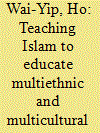

|
|
|
|
|
| Publication |
2008.
|
| Summary/Abstract |
In the post-9/11 era, growing scholarly literature and social concern have focused on Islamic education in Muslim-majority countries and for Muslim minorities in the West. However, public attention and academic research concerning the teaching of Islam as a world religion and a commonly shared human civilization, are barely understood in secular contexts and in public education. This issue requires more attention, especially in Asia. For the sake of future dialogue and further discussion, this paper is a tentative attempt at initiating this understudied issue of teaching Islam as multicultural literacy. It inquires about the pedagogy of teaching Islam in an East Asian context by first briefly reflecting on the dilemmas of introducing Islam to the West and its implications for the university curriculum. Departing from the experience in North America and European societies, this article then attempts to explore alternative pedagogical discourse in teaching Islam to Chinese students in the East Asian context by considering its specific geographical position in global politics and the recent development of Hong Kong. This article finally foresees the developing pedagogy of Islamic teaching that challenges students to break away from the media clich and apathy towards human suffering, leading them to understand that they themselves are the potential peacemakers of a future global multiethnic and multicultural society.
|
|
|
|
|
|
|
|
|
|
|
|
|
|
|
|
| 12 |
ID:
006468
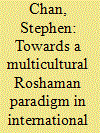

|
|
|
|
|
| Publication |
Tampere, PEace Research Institute, 1996.
|
| Description |
150p.
|
| Series |
TPRI Research Report;74
|
| Standard Number |
9517061617
|
|
|
|
|
|
|
|
|
|
|
|
Copies: C:1/I:0,R:0,Q:0
Circulation
| Accession# | Call# | Current Location | Status | Policy | Location |
| 038213 | 327/CHA 038213 | Main | On Shelf | General | |
|
|
|
|
|
|
|
|
|